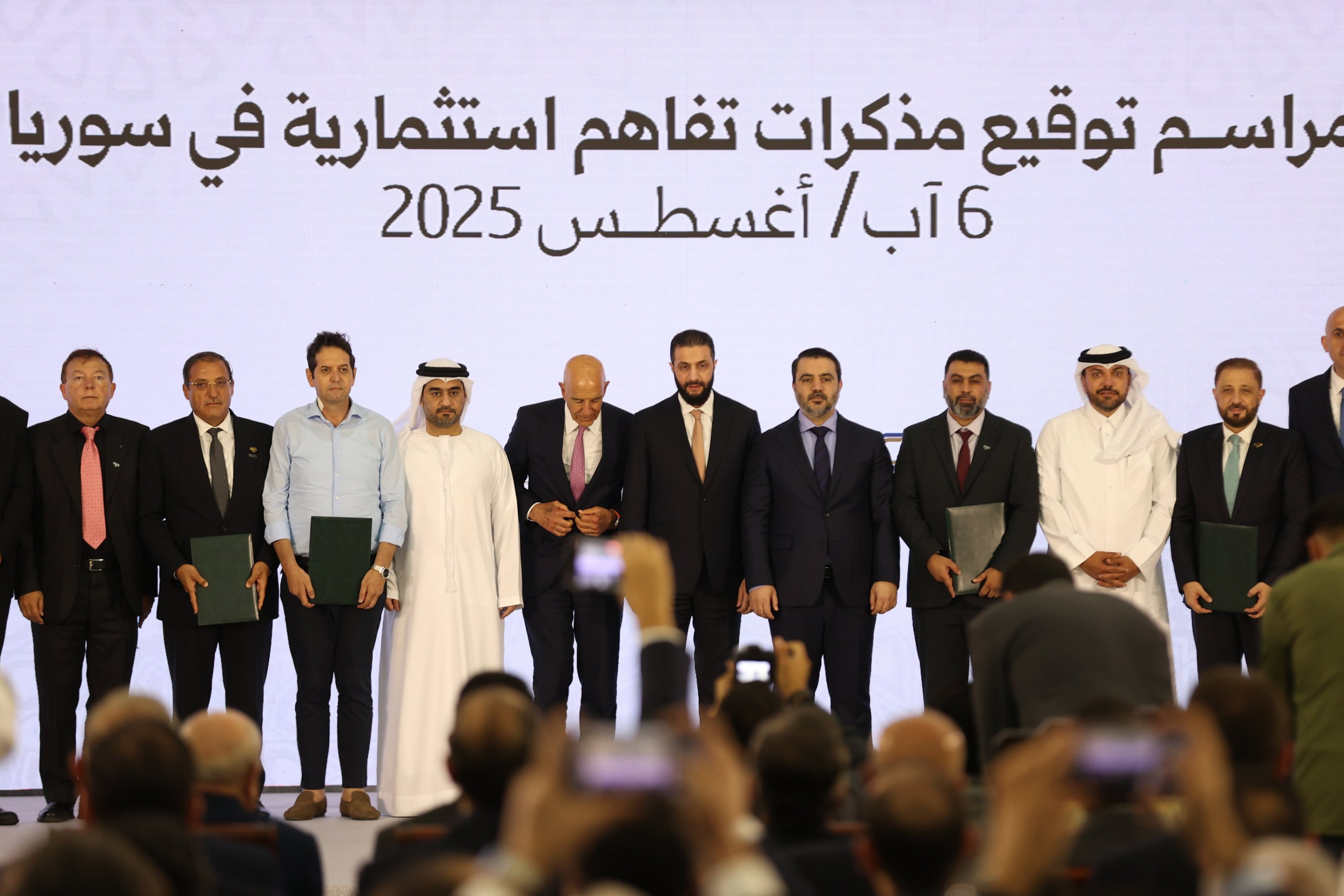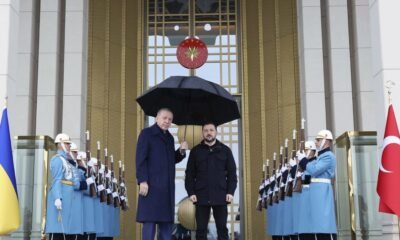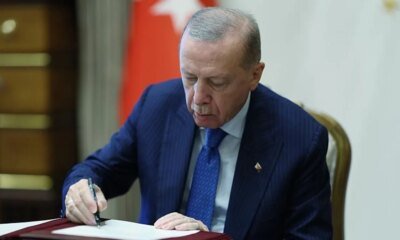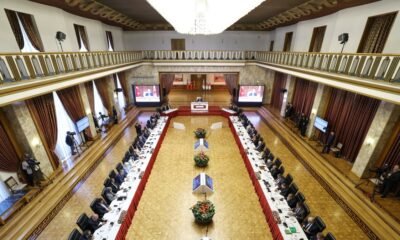Economy
US appeals court allows Trump to continue collecting tariffs for now
A U.S. federal appeals court on Thursday granted President Donald Trump approval to continue collecting tariffs under an emergency powers law for now, while his administration appeals a ruling that struck down much of his flagship economic agenda.
The Court of Appeals for the Federal Circuit granted an emergency motion from the Trump administration arguing that a halt is “critical for the country’s national security.”
The short-term relief will allow for an appeals process to proceed, after the Court of International Trade on Wednesday barred most of the tariffs announced since Trump took office, ruling that he had overstepped his authority.
Trump is facing several lawsuits arguing that his “Liberation Day” tariffs exceeded his authority and left the country’s trade policy dependent on his whims.
Since returning to the presidency in January, Trump has moved to reconfigure U.S. trade ties with the world while using levies to force foreign governments to the negotiating table.
But the stop-start tariff rollout, impacting both allies and adversaries, has roiled markets and snarled supply chains.
Prior to Thursday’s decision from the U.S. Court of Appeals for the Federal Circuit, known as an administrative stay, the White House was given 10 days to halt affected tariffs.
The Trump administration called the ruling “blatantly wrong,” filing an appeal and expressing confidence that the decision would be overturned.
White House spokesperson Karoline Leavitt told reporters that the judges “brazenly abused their judicial power to usurp the authority of President Trump.”
Leavitt said the Supreme Court “must put an end” to the tariff challenge, while stressing that Trump has other legal means to impose levies.
‘Hiccups’
Kevin Hassett, director of the National Economic Council, told Fox Business that “hiccups” sparked by the decisions of “activist judges” would not affect talks with trading partners, adding that three deals are close to finalization.
Trump’s trade advisor, Peter Navarro, told reporters after the appellate ruling that the administration had received “plenty of phone calls from countries” who said they would continue to “negotiate in good faith,” without naming those nations.
Trump’s import levies are aimed at punishing economies that sell more to the United States than they buy.
The president has argued that trade deficits and the threat posed by drug smuggling constituted a “national emergency” that justified the widespread tariffs – which the Court of International Trade ruled against.
Trump unveiled sweeping import duties on nearly all trading partners in April, at a baseline 10% – plus steeper levies on dozens of economies, including China and the EU, which have since been paused.
The U.S. trade court’s Wednesday ruling quashed these blanket duties, alongside those that Trump imposed on Canada, Mexico and China separately using emergency powers.
But it left intact 25% duties on imported autos, steel and aluminum.
Beijing, which was hit by an additional 145% tariffs before they were temporarily reduced to make space for negotiations, reacted to the trade court decision by saying Washington should scrap the levies.
“China urges the United States to heed the rational voices from the international community and domestic stakeholders and fully cancel the wrongful unilateral tariff measures,” said Commerce Ministry spokesperson He Yongqian.
Asian markets rallied Thursday, U.S. indexes closed higher while Europe closed slightly down.
‘Extraordinary threat’
The federal trade court was ruling in two separate cases – brought by businesses and a coalition of state governments – arguing that the president had violated Congress’s power of the purse.
The judges said the cases rested on whether the International Emergency Economic Powers Act of 1977 (IEEPA) delegates such powers to the president “in the form of authority to impose unlimited tariffs on goods from nearly every country in the world.”
The judges stated that any interpretation of the IEEPA that “delegates unlimited tariff authority is unconstitutional.”
Analysts at London-based research group Capital Economics said the case may end up with the Supreme Court, but would likely not mark the end of the tariff war.
Economy
Trump nominates top economic aide Stephen Miran for vacant Fed seat
U.S. President Donald Trump said Thursday he will nominate a top economic adviser to the Federal Reserve’s Board of Governors, temporarily filling a vacancy as he seeks to boost his sway over the independent central bank.
Trump said he has named Stephen Miran, the chair of the White House’s Council of Economic Advisers, to fill a seat vacated by Governor Adriana Kugler, a former President Joe Biden appointee who is stepping down Friday.
Kugler announced a surprise resignation last week, as she returns to her tenured professorship at Georgetown University.
Miran, if approved by the Senate, will serve until Jan. 31, 2026.
Trump said the White House continues to search for a permanent replacement to serve in the 14-year Fed Board seat that opens Feb. 1.
The appointment is Trump’s first opportunity to exert more control over the Fed, one of the few remaining independent federal agencies. Trump has relentlessly criticized the current chair, Jerome Powell, for keeping short-term interest rates unchanged, calling him “a stubborn MORON” last week on social media.
Miran has advocated for a far-reaching overhaul of Fed governance that would include shortening Board member terms, putting them under the clear control of the president, and ending the “revolving door” between the executive branch and the Fed.
He has also been a major defender of Trump’s income tax cuts and tariff hikes, arguing that the combination will generate enough economic growth to reduce budget deficits.
Miran, who obtained a PhD in economics from Harvard, also has played down the risk of Trump’s tariffs generating higher inflation, a major source of concern for Powell.
His 41-page essay titled “A User’s Guide to Restructuring the Global Trading System” has been seen as providing rationale for Trump’s aggressive trade policies.
The choice of Miran may heighten concerns about political influence over the Fed, which has traditionally been insulated from day-to-day politics.
Fed independence is generally seen as key to ensuring that it can take difficult steps to combat inflation, such as raising interest rates, that politicians might be unwilling to take.
Federal Reserve governors vote on all the central bank’s interest-rate decisions, as well as its financial regulatory policies.
Miran’s nomination, if approved, would add a near-certain vote in support of lower interest rates.
At its most recent meeting last week, Fed officials kept their key rate unchanged at 4.3%, where it has stood after three rate cuts late last year. But two Fed governors – Christopher Waller and Michelle Bowman – dissented from that decision. Both were appointed by Trump in his first term.
Still, even with Miran on the board, 12 Fed officials vote on rate policy and many remain concerned that Trump’s sweeping tariffs could push inflation higher in the coming months.
After the July jobs report was released last Friday, Miran criticized Powell for not cutting rates, saying that Trump had been proven correct on inflation during his first term and would be again.
The president has pressured Powell to cut rates under the belief that his tariffs will not fuel higher inflationary pressures.
“What we’re seeing now in real time is a repetition once again of this pattern where the president will end up having been proven right,” Miran said on MSNBC.
“And the Fed will, with a lag and probably quite too late, eventually catch up to the president’s view.”
Trump said Miran would do an “outstanding” job in his new post.
“Has been with me from the beginning of my Second Term, and his expertise in the World of Economics is unparalleled,” Trump wrote on Truth Social. “Congratulations Stephen!”
Economy
Trump team reportedly favors Christopher Waller as Fed chair pick
Federal Reserve (Fed) Governor Christopher Waller is emerging as a top candidate to be the U.S. central bank’s next chair, a report said on Thursday, citing people familiar with the matter.
Waller has met with members of President Donald Trump’s team, who are impressed with him, though he has not met with the president, Bloomberg News reported. A Fed spokesperson had no comment.
“President Trump will continue to nominate the most competent and experienced individuals to deliver on his pledge to Make America Wealthy Again,” White House spokesperson Kush Desai said.
“Unless it comes from President Trump himself, however, any discussion about personnel decisions should be regarded as pure speculation.”
Trump has repeatedly criticized Fed Chair Jerome Powell for not cutting interest rates, and while he has backed off threats to try to oust Powell before his term ends on May 15, has accelerated the search for a replacement.
Trump’s pick will be closely scrutinized for a perceived ability to carry out monetary policy without ceding to political pressure, a quality that economists say is the bedrock of any central bank’s inflation-fighting capabilities and what underpins the financial stability of the U.S. economy.
Powell has not said if he would break with tradition and stay on as Fed governor after his chair term ends, though analysts speculate that if he felt the Fed’s independence was under threat, he would do so to deny Trump the chance to fill another open Fed seat.
Waller, a PhD economist whose first speech after becoming Fed governor was about the central bank’s independence, could allay those concerns.
Waller wanted an interest-rate cut at the Fed’s July meeting, and dissented along with fellow Trump appointee Fed Vice Chair Michelle Bowman when the majority decided to leave short-term borrowing costs unchanged.
While Trump has called for lower rates in order to reduce the cost of government borrowing, Waller has built his case for lower rates on the argument that tariffs won’t boost inflation and that a slowing labor market needs the support of easier policy.
He has rejected the idea that rate-setting should have anything to do with making financing cheaper for the U.S. Treasury.
White House economic advisor Kevin Hassett and former Fed Governor Kevin Warsh, both of whom have also expressed support for cutting interest rates, remain under consideration for the Fed chair job as well, Bloomberg News said.
Trump on Wednesday said both men and an unnamed third person are candidates to fill a soon-to-be-open seat on the Fed board vacated by Governor Adriana Kugler, whose unexpired term runs through January.
Economy
Chinese shippers defy tensions as exports top expectations in July
China’s exports exceeded forecasts in July, as manufacturers capitalized on a fragile tariff truce between Beijing and Washington to ship goods, particularly to Southeast Asia, ahead of tougher U.S. duties targeting transshipment.
Global traders and investors are waiting to see whether the world’s two largest economies can agree on a durable trade deal by Aug. 12 or if global supply chains will again be upended by the return of import levies exceeding 100%.
U.S. President Donald Trump is pursuing further tariffs, including a 40% duty on goods rerouted to the U.S. via transit hubs that took effect on Thursday, as well as a 100% levy on chips and pharmaceutical products and an additional 25% tax on goods from countries that buy Russian oil.
China’s exports rose 7.2% year-on-year in July, customs data showed on Thursday, beating a forecast 5.4% increase in a Reuters poll and accelerating from June’s 5.8% growth.
Imports grew 4.1%, defying economists’ expectations for a 1.0% fall and climbing from a 1.1% rise in June.
China’s trade war truce with the U.S. – the world’s largest consumer market – ends next week, although Trump hinted that further tariffs may be imposed on Beijing due to its continued purchases of Russian hydrocarbons.
“The trade data suggests that the Southeast Asian markets play an ever more important role in U.S.-China trade,” said Xu Tianchen, senior economist at The Economist Intelligence Unit.
“I have no doubt Trump’s transshipment tariffs are aimed at China, since it was already an issue during Trump 1.0. China is the only country for which transshipment makes sense, because it still enjoys a production cost advantage and is still subject to materially higher U.S. tariffs than other countries,” he added.
China’s exports to the U.S. fell 21.67% last month compared to the same period a year earlier, according to the data, while shipments to the Association of Southeast Asian Nations (ASEAN) rose 16.59% over the same period.
The levies are bad news for many U.S. trading partners, including the emerging markets in China’s periphery that have been buying raw materials and components from the regional giant and furnishing them into finished products as they seek to move up the value chain.
China’s July trade surplus narrowed to $98.24 billion from $114.77 billion in June. Separate U.S. data released on Tuesday showed that the trade deficit with China shrank to its lowest level in more than 21 years in June.
Despite the tariffs, markets showed optimism for a breakthrough between the two superpowers, with China and Hong Kong stocks rising in morning trade. Trump indicated earlier this week that he might meet Chinese President Xi Jinping later this year if a trade deal was reached.
Trade uncertainty
China’s commodities imports painted a mixed picture, with soybean purchases hitting record highs in July, driven by bulk buying from Brazil while avoiding U.S. cargoes. Analysts, however, cautioned that inventory building may have skewed the import figures, masking weaker underlying domestic demand.
“While import growth surprised on the upside in July, this may reflect inventory building for certain commodities,” said Zichun Huang, China economist at Capital Economics, pointing to similarly strong purchases of crude oil and copper.
“There was less improvement in imports of other products and shipments of iron ore continued to cool, likely reflecting the ongoing loss of momentum in the construction sector,” she added.
A protracted slowdown in China’s property sector continues to weigh on construction and broader domestic demand, as real estate remains a key store of household wealth.
Chinese government advisers are stepping up calls to make the household sector’s contribution to broader economic growth a top priority at Beijing’s upcoming five-year policy plan, as trade tensions and deflation threaten the outlook.
Reaching an agreement with the U.S. and the European Union, which have accused China of producing and selling goods at too low a price, would give Chinese officials more room to advance their reform agenda.
However, analysts expect little relief from Western trade pressures. Export growth is projected to slow sharply in the second half of the year, hurt by persistently high tariffs, President Trump’s renewed crackdown on the rerouting of Chinese shipments and deteriorating relations with the EU.
Economy
Climate change drives up global food prices, adds to societal risks
Extreme weather patterns and events resulting from climate change are causing the prices of food products, such as coffee, cocoa and rice, to rise in various countries and regions around the world, according to a report released on Thursday, citing a recently published study.
The increase in temperature and extreme weather events, such as floods and storms, caused by climate change, also affect agricultural activities and threaten food security.
In July, scientists from various research institutes in Europe conducted a study titled “Climate extremes, food price spikes and their wider societal risks.”
In the study, which examined the impact of climate change on food prices, scientists compiled reports highlighting the rise in food prices across different countries due to climate extremes.
According to the study, agricultural products affected by climate change vary according to their geographical location.
The severe droughts experienced in Southern Europe during 2022-2023 led to a 50% increase in olive oil prices across the European Union as of January 2024. Moreover, at the beginning of 2024 in the U.K., potato prices rose by 22% due to rainy weather conditions.
In East Asia, the heat waves in 2024 led to extreme temperatures in almost all of South Korea and Japan, as well as large areas of China and India. These extreme weather events increased the price of Korean cabbage by 70% in September 2024 compared to the same month the previous year. Japanese rice also rose by 48% during the same period. Additionally, vegetable prices in China increased by 30% in June and August.
Impact on various crops
In Vietnam, after the heat wave in February 2024, robusta coffee prices doubled by July. Similarly, in Indonesia, following the drought in 2023, rice prices increased by 16%.
And in Pakistan, food prices in rural areas rose by 50% within weeks following the devastating floods in August 2022. In neighboring India, following the heat wave in May 2024, onion and potato prices surged in the second quarter of the year. During this period, onion prices increased by 89% and potato prices by 81%.
In Australia, the floods in 2022 caused lettuce prices to rise. During this period, lettuce prices increased by staggering 300%.
After the heat wave in March 2024 in South Africa, corn prices rose by 36% in April. The 2022 drought in Ethiopia also had an adverse impact on food prices. Following the drought, food prices increased by 40% in March 2023.
At the same time, back in 2022, drought in the American states of California and Arizona, which provide over 40% of the national vegetable production, severely affected vegetable production. As of November 2022, vegetable prices in the U.S. increased by 80% in one year.
Following the 2023 drought in Mexico, there was a 20% increase in fruit and vegetable prices at the beginning of the following year.
Coffee, cocoa prices
Climate extremes not only caused price increases locally but also increased the global market prices of major food commodities such as coffee and cocoa.
The 2023 drought in Brazil, the world’s largest coffee producer, led to price increases. Global coffee prices rose by 55% in August 2024.
In Ghana and Ivory Coast, which account for about 60% of global cocoa production, extreme heat in February 2024 and ongoing prolonged drought from the previous year affected global cocoa prices. Cocoa prices increased by about 300% in one year as of April 2024.
Affecting numerous crops and spreading globally, the climate-induced surge in food prices can trigger various societal risks.
Increasing food prices, particularly for low-income households, significantly affects their food security. Such households may become less resistant to diseases due to inadequate nutrition, adding additional burdens to the health care system and increasing public expenditures.
Moreover, increases in food prices lead to a rise in overall inflation, posing significant risks for developing countries where the share of food prices in inflation is high.
Economy
Consortium with Turkish firms inks $4B deal to develop Damascus Airport
A five-company consortium led by Qatar’s UCC Holding and comprising three Turkish firms signed a $4 billion deal on Wednesday with the Syrian Civil Aviation Authority to develop and expand Damascus International Airport.
The deal was one of several agreements signed in Damascus during a ceremony attended by Syrian interim President Ahmed al-Sharaa, worth $14 billion, including infrastructure, transportation and real estate projects aimed at reviving the war-damaged economy.
Turkish companies Kalyon Holding, Cengiz Holding and TAV Construction, along with UCC Holding and Assets Investments from the U.S., will be involved in redeveloping Damascus International Airport, aiming to raise its annual passenger capacity to 31 million within eight years, an Anadolu Agency (AA) report said.
The deal marks one of the largest infrastructure projects in Syria in years, despite the country’s prolonged instability following more than a decade of civil war and the wider impacts of the second year of Israel’s genocidal war on Gaza and regional conflicts.
According to a statement from Kalyon Holding, the companies involved have carried out global-scale investments in energy, infrastructure and transportation both in Türkiye and abroad.
The new airport deal follows a $7 billion strategic cooperation agreement signed last May between the Syrian Ministry of Energy and the same core consortium, including Kalyon Holding, Cengiz Holding, UCC from Qatar and Power International from the U.S.
The agreement includes a 5,000 megawatt (MW) energy project, expected to generate approximately 35 billion kilowatt-hours (kWh) annually, supplying a significant share of Syria’s electricity needs.
‘To leave a legacy’
Chairperson of the board of Kalyon Construction, Murathan Kalyoncu, said the new airport deal reflects the group’s commitment to long-term regional development.
“As a domestic and national company, we have focused on people in every region we have operated in for 81 years and aim to leave a legacy for future generations,” he said.

“We successfully completed the construction of Istanbul Airport, Türkiye’s largest infrastructure project, in a record 42 months with a consortium including Cengiz Holding. We then elevated the airport to a global leadership position as a hub with an annual passenger capacity of 90 million.”
“Now, I wholeheartedly believe that with our management experience, engineering strength, technical competence and solution-oriented approach, we will make significant contributions to Damascus’s transformation into a regional air transportation hub,” Kalyoncu added. “I hope the massive investments we have undertaken will mark a turning point for Syria and provide significant support for regional development and stability.”
Alongside the airport investment, Syria signed a series of investment memoranda worth $14 billion on Wednesday, covering 12 strategic projects with several foreign firms.
Talal al-Hilali, director of the Syrian Investment Authority, said the agreements include a $4 billion deal with Qatar’s UCC Holding for the Damascus International Airport project, a $2 billion agreement with the UAE’s national investment corporation to build a metro line in Damascus, and a $2 billion contract with Italy-based UBAKO to develop Damascus Towers.
In July, Syria also signed $6.4 billion of investments with Saudi Arabia as it seeks to rebuild after years of civil war.
Economy
Slovenia bans imports from illegal Israeli settlements over Gaza crisis
The Slovenian government announced on Wednesday a ban on imports of goods from illegal Israeli settlements in the occupied West Bank, in a “symbolic measure” designed to ratchet up diplomatic pressure over the war in Gaza.
Slovenia’s government has frequently criticized Israel over the conflict and last year moved to recognize a Palestinian state as part of efforts to end the fighting in Gaza as soon as possible.
“The actions of the Israeli government … constitute serious and repeated violations of international humanitarian law,” the government said in a statement on Wednesday.
Slovenia “cannot and must not be part of a chain that enables or overlooks” such violations, it said, including the “construction of illegal settlements, expropriations, the forced evictions of the Palestinian population.”
The Slovenian government thus decided to “ban imports of goods originating from Israeli illegal settlements.”
Its latest move represents a “clear reaction to the Israeli government’s policy, which … undermines the possibilities for lasting peace and a two-state solution.”
“While symbolic,” the ban “is a necessary response to the ongoing humanitarian and security situation in Gaza,” Slovenia’s Foreign Minister Tanja Fajon said of the measure.
The government said that it was also examining a ban on exports of goods from Slovenia “destined for (the) illegal settlements,” saying that it would then “decide on further measures.”
According to the STA news agency, citing a government statement from January, Slovenia did not import any goods from Israeli settlements in 2022 and 2024, respectively.
In 2023, imports amounted to some 2,000 euros.
Early in July, Slovenia was the first EU country to ban two far-right Israeli ministers from entering the country.
It declared both Israelis “persona non grata,” accusing them of inciting “extreme violence and serious violations of the human rights of Palestinians” with “their genocidal statements.”
In June 2024, Slovenia’s parliament passed a decree recognizing Palestinian statehood, following in the steps of Ireland, Norway and Spain.
-

 Sports2 days ago
Sports2 days agoBengisu Avcı makes Turkish sports history by conquering Ocean’s 7
-

 Politics2 days ago
Politics2 days agoErdoğan to visit Ukraine, free trade on agenda: Envoy
-

 Daily Agenda3 days ago
Daily Agenda3 days agoHalf of us and hearts are comfortable nests peaceful
-

 Daily Agenda3 days ago
Daily Agenda3 days agoThe case is over
-

 Economy2 days ago
Economy2 days agoArgentina’s Milei vetoes pension, disability spending hikes
-

 Economy1 day ago
Economy1 day agoPublic land formula essential for transformation
-

 Daily Agenda2 days ago
Daily Agenda2 days agoThe Chief of General Staff changed with the age decision
-

 Politics2 days ago
Politics2 days agoTerror-free Türkiye committee convenes for first time




